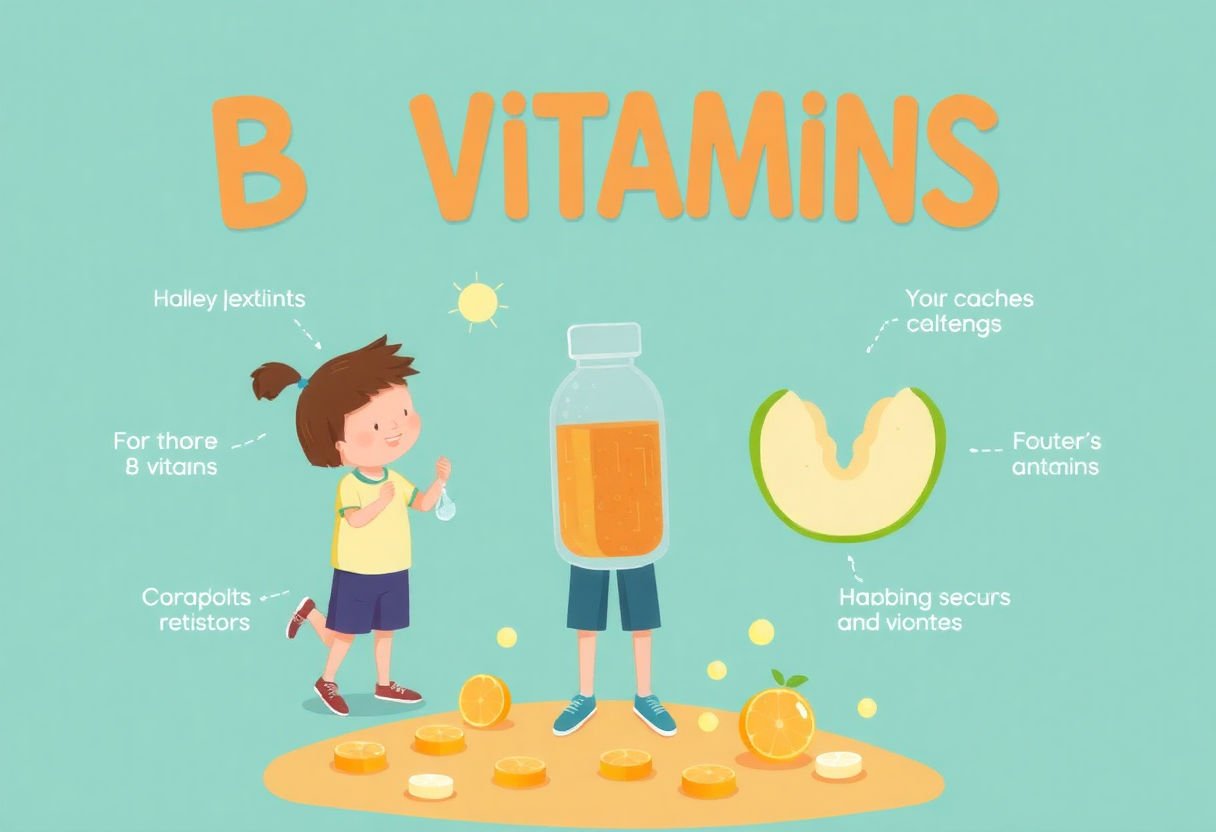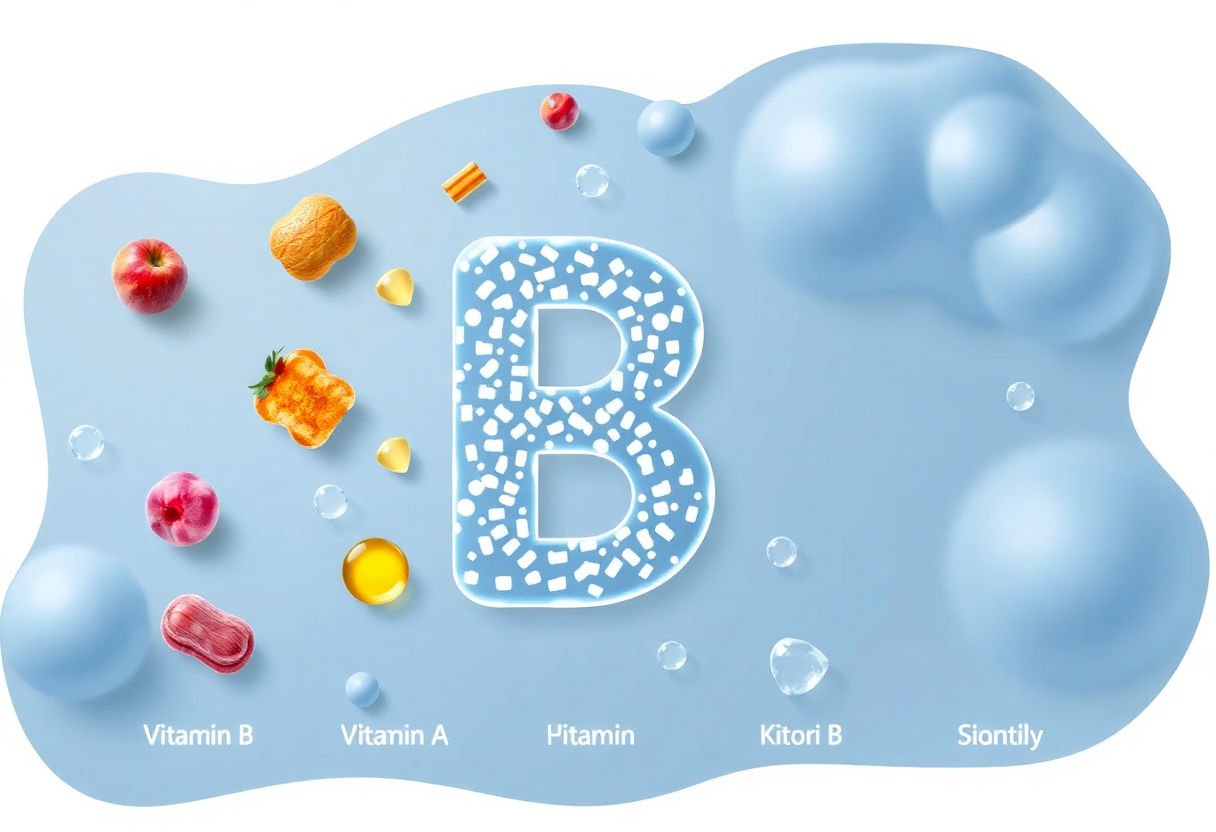Understanding the importance of vitamin B complex in children’s health is crucial for promoting overall well-being and development. Selecting the right vitamin B supplement can significantly enhance your child’s energy levels, support brain development, and strengthen their immune system. This article delves into the myriad benefits of vitamin B complex for kids, outlines symptoms that may indicate a deficiency, and provides comprehensive guidelines for choosing the ideal supplement. By exploring both dietary sources and potential risks, we aim to equip parents with the knowledge necessary to make informed decisions regarding their child’s nutritional needs.
Key Takeaways
- Vitamin B complex plays a crucial role in children’s health by supporting energy production, brain development, and overall growth.
- When selecting a kids vitamin B complex, consider factors such as age-appropriateness, ingredient quality, and the manufacturer’s reputation.
- Key benefits of vitamin B supplementation include enhanced cognitive functions, stronger immune systems, and improved mood regulation in children.
- Recognizing signs of vitamin B deficiency early, like fatigue and irritability, can help determine the need for supplementation.
- Consulting healthcare professionals prior to beginning any vitamin regimen ensures safety and efficacy tailored to your child’s specific needs.
Benefits of Vitamin B Complex for Children

Vitamin B complex plays a critical role in a child’s development, supporting various aspects of their growth and health. The range of B vitamins works synergistically to enhance numerous bodily functions essential for children.
One of the primary benefits is energy production. Vitamins like B1 (thiamine) and B2 (riboflavin) are pivotal in helping convert nutrients into energy, ensuring that children have the vitality needed for active play and learning. This group of vitamins also supports metabolism regulation, aiding in the efficient processing of carbohydrates, proteins, and fats.
Additionally, the B complex is vital for brain development and function. Vitamin B6 (pyridoxine) is essential for neurotransmitter production, which influences mood and cognitive abilities. Vitamin B12 (cobalamin) works collaboratively with folate to support neurological function, potentially improving concentration and memory in school-aged children.
Vitamin B complex also contributes to the formation of red blood cells, with vitamin B12 and folate being crucial elements in preventing anemia, thus enhancing oxygen transport around the body.
Moreover, B vitamins play a role in maintaining healthy skin and eyes. Supplements or adequate intake from foods can help in keeping skin issues at bay, contributing to overall dermatological health.
A consistent intake of vitamin B through both diet and supplements ensures that children are equipped with the nutrients they need to thrive, promoting optimal growth and development during these crucial years.
Components of Vitamin B Complex
Vitamin B complex is a group of eight essential vitamins that play critical roles in maintaining a child’s health. Each vitamin within the complex has unique functions vital for growth and development. Understanding these components can help in selecting the best supplement for your child.
-
Vitamin B1 (Thiamine) is essential for converting carbohydrates into energy, supporting a child’s metabolic processes and nervous system health. It aids in promoting normal growth and development.
-
Vitamin B2 (Riboflavin) works as an antioxidant, crucial for energy production and cellular function. It protects cells from oxidative stress, contributing to healthy skin and vision.
-
Vitamin B3 (Niacin) assists in DNA repair and the conversion of food into energy. This vitamin is vital for maintaining the health of a child’s digestive system and skin.
-
Vitamin B5 (Pantothenic Acid) is integral to synthesizing coenzyme A, necessary for fatty acid metabolism. It supports hormone production and overall energy metabolism.
-
Vitamin B6 (Pyridoxine) plays a role in cognitive development, particularly in areas related to mood and behavior. This vitamin is crucial for neurotransmitter synthesis and immune function.
-
Vitamin B7 (Biotin) supports healthy skin, hair, and nails. It is involved in the metabolism of fats and carbohydrates, contributing to overall metabolic health.
-
Vitamin B9 (Folate/Folic Acid) is necessary for DNA formation and cellular division. This vitamin is essential during periods of rapid growth, such as childhood and adolescence.
-
Vitamin B12 (Cobalamin) is involved in red blood cell formation and neurological function. It aids in promoting brain health and cognitive development.
Ensuring an adequate intake of these vitamins is essential for a child’s overall health and growth, making the selection of a comprehensive vitamin B complex supplement a crucial consideration for parents.
Signs Your Child May Need a Vitamin B Supplement

Recognizing the potential need for a vitamin B supplement in your child’s diet is crucial for their overall health and development. Vitamin B deficiencies can manifest through a variety of symptoms, and being aware of these signs can help you make informed decisions about nutritional supplements.
Common Symptoms of Vitamin B Deficiency
-
Lack of Energy and Fatigue: Children who frequently feel tired or lack energy, despite getting adequate sleep, may be experiencing a shortage of vitamin B, particularly B12, which plays a vital role in energy production.
-
Mood Changes and Irritability: Noticeable mood swings or irritability in children can sometimes be linked to insufficient levels of certain B vitamins, such as B6, which is important for neurotransmitter synthesis affecting mood regulation.
-
Growth and Development Delays: A delay in growth or physical development can indicate a deficiency in B vitamins, as they are essential for cellular growth and metabolism.
-
Pale Skin and Anemia: If a child exhibits unusually pale skin or symptoms of anemia, such as dizziness or headaches, a deficit in vitamins like B12 and B9 (folate) might be the cause.
-
Poor Concentration and Memory: Struggles with concentration, learning, and memory can sometimes be alleviated by addressing deficiencies in B6 and B12, which support neurological functions.
Dietary Factors
Inadequate dietary intake due to picky eating habits can also lead to insufficient levels of B vitamins. Foods rich in vitamin B, such as whole grains, meat, eggs, dairy products, beans, and green leafy vegetables, are often missing from the diet of selective eaters.
Monitoring your child’s symptoms and dietary intake can guide you in determining if supplementation may be necessary to support their overall health and development.
Choosing the Right Vitamin B Complex Supplement

When selecting the appropriate vitamin B complex supplement for your child, several critical factors must be considered to ensure both efficacy and safety. First, it’s essential to verify the purity and quality of the supplement. Look for products that have been tested by third-party organizations, which can certify that the supplement meets safety and quality standards. This certification acts as a guarantee that the product does not contain harmful additives or contaminants.
Next, consider the form of the supplement: Vitamin B complexes for children commonly come in liquid, chewable, or gummy forms, each offering unique advantages. Liquid supplements are often best for younger children who may have difficulty swallowing pills, while chewables and gummies can make daily supplementation an enjoyable routine for older children.
The dosage is another vital aspect. Children’s dietary requirements differ significantly from adults, so ensure that the supplement provides age-appropriate doses of each B vitamin. Consult with your child’s pediatrician to tailor the dosage to your child’s specific needs, as excessive intake of certain B vitamins can lead to adverse effects.
Additionally, assess the allergen information and ingredient list. Choose a supplement that is free from common allergens such as gluten, soy, and dairy to prevent potential allergic reactions.
Finally, evaluate the reputation of the brand. Opt for well-established manufacturers known for their commitment to child health and transparency. This step not only provides peace of mind but also ensures a trustworthy and effective supplement choice for your child.
Natural Sources of Vitamin B for Children
Incorporating foods rich in vitamin B into your child’s diet is an effective way to meet their nutritional needs without resorting to supplements. Vitamin B, essential for energy production and brain development, is found naturally in a variety of foods that can be easily integrated into daily meals.
One of the richest sources of B vitamins is whole grains, including brown rice, oats, and whole wheat bread. These grains are packed with vitamin B1 (thiamine), B2 (riboflavin), and B3 (niacin), which are crucial for energy metabolism. Fortified cereals also serve as an excellent breakfast option for children, ensuring they start their day with essential nutrients.
Dairy products like milk and yogurt are not only good sources of calcium but also provide vitamin B2. Including a glass of milk or a serving of yogurt with meals can help boost your child’s intake of this important vitamin, which supports healthy skin and eyes.
Eggs are another versatile food that provides a significant amount of vitamin B12 and B7 (biotin). B12 is particularly important for maintaining nerve function and red blood cell production. Adding eggs to your child’s diet, whether scrambled, boiled, or as an omelet, can greatly benefit their overall health.
Meats such as chicken, pork, and fish are excellent for obtaining vitamin B6 and B3. These vitamins play a role in cognitive development and hormone regulation. Including lean meats at lunchtime or dinner can effectively enhance your child’s vitamin B intake.
For vegetarian families, legumes like beans and lentils are fantastic alternatives. They are rich in vitamin B9 (folic acid), crucial for DNA synthesis and cell growth. Introducing legumes in soups or salads can help ensure adequate consumption of this vitamin.
In sum, a balanced diet that includes a variety of these natural sources can help fulfill your child’s vitamin B requirements, supporting their health and development in multiple ways.
Potential Side Effects and Risks
Vitamin B complex supplements are generally safe, but it’s crucial to be aware of potential side effects and risks associated with excessive intake. Overconsumption of certain B vitamins can lead to adverse health effects, underlining the importance of adhering to recommended dosages.
Common Side Effects
While most children tolerate vitamin B complex well, some may experience mild side effects, particularly at higher doses. These can include:
- Nausea or upset stomach: Some children might experience gastrointestinal discomfort.
- Skin reactions: Rashes or itching can occasionally occur.
- Headaches: Vitamin supplements can sometimes cause headaches in sensitive individuals.
Risks of Overdose
Although B vitamins are water-soluble and excess amounts are typically excreted through urine, very high doses can pose health risks:
- Vitamin B6 toxicity: Excessive intake can lead to nerve damage, causing numbness or tingling in the limbs.
- Vitamin B3 (Niacin) flush: High doses can result in flushing and, in some cases, liver toxicity.
Special Considerations
Children with specific medical conditions or those on certain medications should be particularly cautious. For example, children with kidney-related issues may need tailored advice on supplement intake. It’s critical to store vitamins out of children’s reach to prevent accidental ingestion that could lead to overdose.
Conclusion on Safety
Consulting a healthcare professional is essential to determine the appropriate dosage and prevent any potential side effects. Ensuring that the vitamin B complex supplement is tailored to fit the unique needs of your child can help mitigate risks, while still reaping its health benefits.
Consulting Healthcare Professionals

For parents considering vitamin B complex supplements for their child, it is paramount to consult with healthcare professionals. Pediatricians play a crucial role in assessing whether supplementation is necessary and can offer insightful guidance tailored to your child’s specific health needs.
These professionals possess the expertise to evaluate your child’s diet and nutritional intake comprehensively. By examining factors such as diet, lifestyle, and any underlying health issues, they can determine if additional vitamin B is required. A pediatrician may also recommend blood tests to check for vitamin deficiencies before recommending supplementation.
Moreover, healthcare providers can help in selecting the right type of vitamin B complex supplement. Given the wide array of products available, it’s essential to choose one that aligns with your child’s health objectives and any existing medical conditions. They can advise on the appropriate dosage based on your child’s age, weight, and health status, ensuring the supplement is safe and effective.
It’s also important to consider potential interactions with other medications or health supplements your child might be taking. A healthcare provider is equipped to foresee possible risks and manage them proactively.
Enlisting the guidance of healthcare professionals not only safeguards your child’s health but also provides peace of mind, ensuring that the best nutritional choices are making a meaningful impact on their overall well-being. Always seek medical advice before starting any supplement regimen to ensure it is the right step for your child’s health journey.
Conclusion
In conclusion, ensuring a balanced intake of vitamin B complex is essential for supporting your child’s energy production and brain development. With numerous options available, it is imperative to choose supplements wisely, considering potential side effects. Foods rich in vitamin B and professional guidance from healthcare experts can further enhance your child’s health. By prioritizing these aspects, you can confidently navigate your child’s nutritional journey, fostering both their growth and well-being. Remember, an informed choice today sets the foundation for a healthier tomorrow.
Frequently Asked Questions
What is the role of vitamin B complex in a child’s development?
Vitamin B complex provides essential nutrients that aid in energy production, support brain development, and promote a healthy nervous system, contributing significantly to a child’s overall growth and wellbeing.
How can I determine if my child needs a vitamin B supplement?
If your child exhibits signs of vitamin B deficiency, such as fatigue, irritability, or poor concentration, it may be beneficial to consult a healthcare professional to assess their need for a supplement.
Are there specific B vitamins more important for children?
While all B vitamins are important, vitamins B6 and B12 are crucial for cognitive development, and B9 (folate) is key for healthy cell growth, especially during rapid growth periods.
How should I choose the best vitamin B complex supplement for my child?
Look for age-appropriate formulations, check for bioavailability of nutrients, and consider the inclusion of any additional supportive ingredients that promote absorption and efficacy.
What are the potential side effects of vitamin B complex supplements in children?
While vitamin B is generally safe, excessive intake can lead to side effects such as nausea or diarrhea. It is important to adhere to recommended dosages and consult a pediatrician if any adverse reactions occur.


